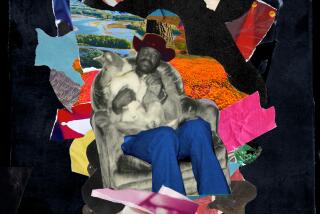James McMurtry Keeps His Distance From His Songs
- Share via
It wasn’t fond memories of the popular board game that inspired singer-songwriter James McMurtry to write the title song of his soon-to-be-released second album, “Candyland.”
“Everybody told me about that after I wrote the song,” he said. “I never played the game. I’m 30 and I guess the Candyland phase must have faded by the time I came along.”
Nor did he write it about his experiences as a relatively new father.
“That hasn’t been reflected in my songwriting,” he said of having a 21-month-old son. “I haven’t gotten to where I can deal with it in writing.”
Instead, the song “Candyland,” a condemnation of pristine suburbia, filled purely practical purposes rather than artistic ones.
“I needed a fast song when I was in the studio recording the album,” he explained in his laconic Texas drawl, phoning from the road in Omaha. “Everything was coming out mid-tempo and the band was getting annoyed. So we rocked out and they liked me again after that.”
So much for the mysteries of art. But that’s just the kind of mundane insight McMurtry hopes fans are taking home from a series of shows he and four other songwriters are doing across the country. Under the banner “In Their Own Words,” McMurtry, Marshall Crenshaw, Don Dixon, David Halley and Jules Shear are the second group of singer-songwriters making a tour that’s an extension of regular songwriters round-tables held at New York’s Bottom Line club.
The tour, in which the five just sit on stage in a semicircle trading songs and anecdotes, comes to the Troubadour tonight and concludes with shows Thursday at the Coach House in San Juan Capistrano and Friday at Sound F/X in San Diego.
What McMurtry wants people to realize is that he’s just a storyteller, that his songs of lost overachievers and restless dreamers are not diary entries.
“That’s always one of my major points,” he said. “A song invents itself, doesn’t necessarily represent your point of view.”
Crenshaw doesn’t always buy McMurtry’s attempts to distance himself from his song subjects.
“I keep waiting for James to bare his soul and tell us the real reality of the reason behind why he started writing songs,” he said of the tour, his first experience with McMurtry. “He’s really guarded. . . . Some people would rather keep some things secret, which is their prerogative.”
For his part, Crenshaw, a veteran pop-rocker at 38, is just the opposite. “I like the songs that are more personal,” he said. “I’m not always blatant about it, but if the writer doesn’t have some feeling for the subject matter, then it’s less likely that he’ll be able to engage someone else’s emotions.”
But McMurtry’s claim that his finely detailed songs are all fiction fits with his genetic heritage--his father is novelist Larry McMurtry (“Lonesome Dove,” “Texasville,” “Terms of Endearment”) and his mother is a literature professor. (His parents separated when he was young and he was raised mostly by his father.) Young McMurtry began playing guitar when he was 7 but didn’t take himself seriously as a songwriter until he entered a songwriting contest at the 1987 Kerrville Folk Festival in Texas and was one of six winners.
Soon his songs came to the attention of John Mellencamp (who collaborated with the senior McMurtry on the recent movie “Falling From Grace”). Mellencamp helped McMurtry get a record contract and produced his debut album, 1989’s “Too Long in the Wasteland.” He’s the executive producer of “Candyland,” which features several members of his band.
Add in such adventures as studying for a year in Madrid and playing guitar for a summer at a roadhouse in Talkeetna, Alaska, and it’s clear that he’s had plenty of experiences that he could mythologize into songs if he chose. But, no, he maintains his stance that he doesn’t write about his own life.
McMurtry won’t even allow the myth that his summer tour as a solo acoustic act was designed to present his songs in a more intimate and affecting setting than he could do with a band.
“Nah, you can’t make money drawing tour support with a band,” he said, dismissing any artistic motives. “Go out solo and you can take it home. That’s the reality of the music business now.”
More to Read
The biggest entertainment stories
Get our big stories about Hollywood, film, television, music, arts, culture and more right in your inbox as soon as they publish.
You may occasionally receive promotional content from the Los Angeles Times.










